Economy
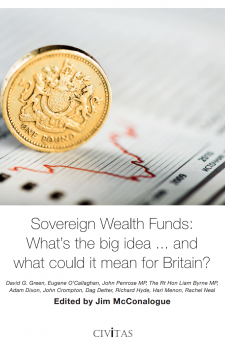
Sovereign Wealth Funds: What’s the big idea ... and what could it mean for Britain?
David G. Green, Eugene O’Callaghan, John Penrose MP, The Rt Hon Liam Byrne MP, Adam Dixon, John Crompton, Dag Detter, Richard Hyde, Hari Menon, Rachel Neal (Edited by Jim McConalogue), March 2024
Sovereign wealth funds (SWFs) are often discussed as government-owned investment funds with their benefits returning to the government and citizens – and which invests its assets according to the interests of the national sovereign sponsor. They play an important role in both global financial markets and in representing important domestic owners of capital. This collection of essays sets out a definition and understanding of sovereign… [Full Details]
Download PDF
Civitas launches new Commission on the Future for Independent Schools
Civitas, January 2024
Civitas has begun work on a major commission on the future for independent schools in England. Independent schools are a significant piece of our national educational infrastructure, teaching 6.5% of school pupils in England; and one whose role has changed significantly over the centuries during which they have existed. Because of this, we want to take an in-depth look at what the future… [Full Details]

The Strategic Dependence of UK Universities on China - and where should they turn next?
Robert Clark, November 2023
This study by Robert Clark investigates two overarching aspects of the dependence of UK universities on China. The first is the ability for UK higher education institutions, universities and academics, to financially de-risk from the People’s Republic of China (PRC), in order to end the reliance on Chinese funding (in terms of international student fees, research grants and donations) made from Chinese entities… [Full Details]
Download PDF
Net Zero: an analysis of the economic impact
Ewen Stewart, September 2023
UPDATE: This report has been taken down from the website because it was found to contain factual errors, it is undergoing revision and a fresh process of peer review. A revised report will be released when this process is completed… [Full Details]

A short route to deindustrialisation?: An introduction to the UK Emissions Trading Scheme (UK ETS) and its challenges
Jim McConalogue, May 2023
In this analysis, Jim McConalogue (CEO, Civitas) looks at the UK’s Emissions Trading Scheme (ETS) and the regulation of carbon emissions on energy intensive industries. This new publication asks whether energy and industrial policy is helping needlessly to render unprofitable energy intensive industries. Investment and recruitment into some of our most important industries may also become harder if they continue to find it difficult… [Full Details]
Download PDF
How UK energy subsidies drove down consumption, pushed up prices and reduced our prosperity
Dr John Constable, March 2023
This briefing from energy expert Dr John Constable, seeks to put the question of falling UK energy consumption into the spotlight, and offers reasons for thinking that it is, or rather should be, a matter of profound concern rather than complacency or even self-congratulation. Constable looks at UK energy consumption over time and shows that our national energy consumption is at its lowest level… [Full Details]
Download PDF Buy from Civitas
Adapting the manufacturing sector for a brighter future: new approaches to energy resilience among SMEs
Jim McConalogue and Aaryaman Banerji, March 2023
In this latest Civitas publication, Dr Jim McConologue and Aaryaman Banerji look into energy resilience among SME manufacturers in the UK. The importance of SMEs within the manufacturing sector and across the UK economy should not be overlooked. There are 244,140 manufacturing businesses across the UK providing just over 2.5 million jobs. 99.5% of those businesses, just under 243,000, are SMEs… [Full Details]
Download PDF Buy from Civitas
China’s increasing influence in the Commonwealth of Nations: A triad of trade, diplomacy, and military relations
Robert Clark, February 2023
The UK has a unique post-Brexit opportunity to re-engage with its Commonwealth partners, forge new and exciting trading relationships – and where it has already done so, to build and capitalise on these with new security agreements which ensure not just the UK’s security but those of its partners, in a long-term, transparent and non-authoritarian manner. Ideologically, the deconstruction of the… [Full Details]
Download PDF Buy from Civitas
Governing the beautiful game: the future of football in civil society
Aaryaman Banerji, February 2023
This Civitas publication looks at the prospect of regulation within English men’s football, something that has a large impact on football fans and the local community. Aaryaman Banerji is a sports researcher at Civitas looking at how we regulate ‘the beautiful game’. Against the backdrop of football’s growing institutional graveyard, with centuries-old clubs now condemned to administration or insolvency, Banerji explores the… [Full Details]
Download PDF Buy from Civitas
An analysis of the effects of taxes and benefits on household income
Tim Knox and Daniel Lilley, January 2023
This analysis of Office for National Statistics (ONS) data for the impact of tax and benefits on household income shows that a record 54.2 per cent of individuals now live in households which receive more in benefits – including ‘benefits in kind such as health and education spending – than they paid in taxes. This is equivalent to 36.0 million individuals. Tim Knox and Daniel… [Full Details]
Download PDF Buy from Civitas
In Defence of Global Britain: The New Government Review of Defence and Security
Robert Clark, November 2022
Former British Prime Minister Liz Truss announced plans to launch a new defence and foreign policy review, whilst in New York to address the United Nations General Assembly in late September. The new British government under Prime Minster Rishi Sunak has confirmed that this new ‘review of the review’ will still take place. The overarching theme reflects the growing awareness in British government that the… [Full Details]
Download PDF
Backing Britain’s Global Champions: The role of trade missions in supporting future exports
Jim McConalogue, July 2022
The Prime Minister and current government have advocated ‘Global Britain’ at several key moments, and it is therefore important to consider what it means and how the UK government can achieve this ambition. This research paper sets out to identify what the UK does differently from France, Germany and Sweden, notably through their outward trade missions and delegations. What are public authorities doing to increase… [Full Details]
Download PDF Buy from Civitas Buy From Amazon
The Next Front?: Sino-Russian Expansionism in the Arctic and a UK response
Robert Clark and Roberto White, June 2022
In this latest publication from the Defence and Security Unit (DSU) at Civitas, Robert Clark and Roberto White highlight the growing risks of Russian and Chinese expansion into the Arctic, calling for a new Canada, UK, US (CAUKUS) defence and security pact to counter Putin’s aggressive Arctic expansionism, and growing Chinese ambition. Former soldier, Robert Clark cautions that military chiefs need to realise the… [Full Details]
Download PDF
Prospects for a Global Britain: Three Strategic Export Industries and How Freeports Can Help
Phil Radford, February 2022
In the third of a three-part series on UK trade, Phil Radford looks at why manufacturing in strategic industries has either moved offshore or stayed offshore. Prospects for a Global Britain: Three Strategic Export Industries and How Freeports Can Help examines what the UK can do to bring it back or encourage new investment. Radford calls on UK plc to recognise where offshoring trends… [Full Details]
Download PDF
Free Trade under Brexit: Why its benefits to the UK have been widely underestimated
Professor Patrick Minford, February 2022
In this report published by Civitas, Patrick Minford (Professor of Applied Economics, Cardiff University) analyses the ways in which official trade modelling and policy assumptions have underestimated the gains from free trade with non-EU countries. The UK government has rolled over almost all Free Trade Agreements between the EU and non-EU countries, negotiated new deals with Australia and New Zealand and formally applied… [Full Details]
Download PDF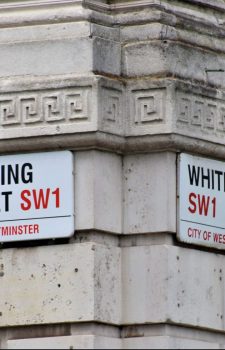
Unravelling the Covid State: From parliamentary democracy to the regulatory state?
Dr Jim McConalogue, December 2021
Britain’s past and current ‘Plan B’ responses to Covid-19 marks the emergence of a new phase in the growth of ‘the regulatory state’ – a new report published by Civitas suggests – in which, crucial decision-making is outsourced to leading quangos. In this new report, Jim McConalogue finds ‘Future reforms need to recognise that the Covid-19 government decision-making process has appeared to… [Full Details]
Download PDF
Discussion paper: The acquisition of Newport Wafer Fab by China’s Wingtech in the context of China’s semiconductor strategy
Radomir Tylecote and Henri Rossano, October 2021
The purchase of the Newport Wafer Fab (NWF) by Dutch company Nexperia – a subsidiary of Chinese firm Wingtech – is currently under review by the UK Government on public interest grounds, and may still be reversed. This discussion paper by Dr Radomir Tylecote and Henri Rossano suggests this ‘acquisition exists within the context of a Chinese state strategy to increase China’s control of semiconductor supply… [Full Details]
Download PDF
Two tests for UK Trade: Does seamless, tariff-free trade boost exports and does distance matter?
Phil Radford, September 2021
During the UK’s departure from the European Union, debate about UK trade policy was dominated by two assertions: That seamless, tariff-free trade with the EU was the optimal outcome for UK manufacturing; That trade grows fastest with countries that are nearest. In this report, trade analyst Phil Radford performs two correlations on UK trade data to scrutinise the evidence for these two assertions… [Full Details]
Download PDF
Towards Strategic Coherence: A discussion of reform proposals following ‘Inadvertently Arming China?’
Radomir Tylecote and Roberto White, July 2021
A Civitas report, Inadvertently Arming China? in February this year revealed the widespread sponsorship of scientific research centres in UK universities by Chinese military-linked conglomerates and universities. It found research at some of these centres is being sponsored by the British taxpayer. Notably, some of these conglomerates produce Weapons of Mass Destruction (WMDs) including intercontinental ballistic missiles (ICBMs) and nuclear warheads. Others manufacture strike… [Full Details]
Download PDF
Lessons learned for a Global Britain: UK trade in manufacturing, 2000-2019
Phil Radford, April 2021
Contrary to common perception, this analysis of the UK’s top ten manufacturing sectors shows that the real value of exports to the EU was lower in 2019 than in 2000 – after adjusting for inflation and extracting the value of precious metals. Neither is this stagnation a Brexit phenomenon. As trade analyst, Phil Radford shows, UK manufacturing exports pivoted decisively away from EU markets in… [Full Details]
Download PDF
Rethinking the UK’s relationship with China: How to address key challenges to British economic security posed by the nascent superpower
Max Klinger and Jim McConalogue, April 2021
‘British policymakers should think carefully about the degree of economic reliance on China that it is wise to tolerate where critical infrastructure is concerned’, a new think-tank paper suggests. The research paper looks at the implications of China’s growing centrality to the world economy for the UK – and sets out a policy framework for addressing the risks it poses. It warns against ‘strategic… [Full Details]
Download PDF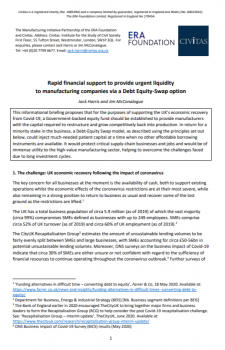
Rapid financial support to provide urgent liquidity to manufacturing companies via a Debt Equity-Swap option
Jack Harris and Jim McConalogue, March 2021
An informational briefing by Jack Harris and Jim McConalogue proposes that for the purposes of supporting the UK’s economic recovery from Covid-19, a Government-backed equity fund should be established to provide manufacturers with the capital required to restructure and grow competitively back into production. The report finds, “The overwhelming bulk of manufacturing jobs in the UK are in the supply-chain, which… [Full Details]
Download PDF
Inadvertently Arming China?: The Chinese military complex and its potential exploitation of scientific research at UK universities
Radomir Tylecote and Robert Clark, February 2021
Revised Edition; Updated 24.02.2021 There is a ‘pervasive presence of Chinese military-linked conglomerates and universities in the sponsorship of high-technology research centres in many leading UK universities and in their research relationships’, a think-tank report has found. In many cases, these UK universities are unintentionally generating research that is sponsored by and may be of use to China’s… [Full Details]
Download PDF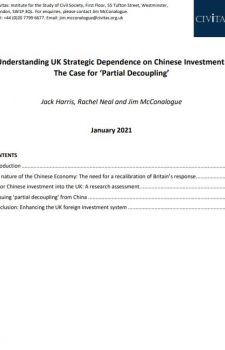
Understanding UK Strategic Dependence on Chinese Investment: The Case for 'Partial Decoupling'
Jack Harris, Rachel Neal and Jim McConalogue, January 2021
Eighty per cent of Chinese investments into UK over decade involve state-owned or Communist Party-linked enterprises Since the beginning of the pandemic there has been a growing public awareness of the nature of the threat China's investment strategy poses to the UK economy and the West. Often missing from this discussion is the extent to which political and security concerns should also… [Full Details]
Download PDF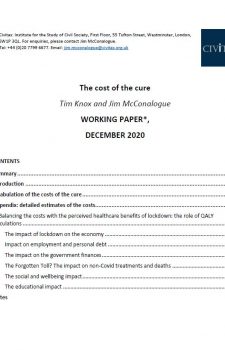
What price lockdown?
Tim Knox and Jim McConalogue, December 2020
As the UK government publishes its cost-benefit analysis of lockdown, Tim Knox and Jim McConalogue attempt to quantify the estimated costs that have been incurred in a new Working Paper, The cost of the cure. Their estimates can be used as a benchmark against which the government analysis can be measured. They find that the cost per year of life saved (QALY) ranges from… [Full Details]
Download PDF
The Elephant in the Room: Why UK living standards may be lower in 2030 than they were in 2019 or even 2007 and what we can do to stop this happening
John Mills, October 2020
Covid-19 has forced the UK into an economic crisis, generating the deep recession with which we are now faced. To bounce back, this book argues, we need a fundamental rethink about the economic policies that have caused us to deindustrialise and to allow the massive imbalances – from which the UK economy currently suffers – to accumulate. Above all, this means reassessing the role of the… [Full Details]
Download PDF Buy from Civitas Buy From Amazon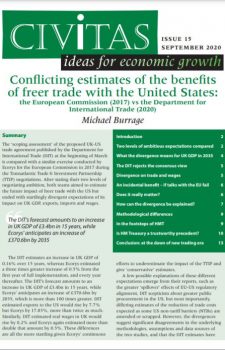
Conflicting estimates of the benefits of freer trade with the United States: the European Commission (2017) vs the Department for International Trade (2020)
Michael Burrage, September 2020
The Trade Secretary is reported to be prepared to rip up the Trade Department’s rulebooks on assessing deals in an attempt to improve how it measures the economic benefits of its post-Brexit 'Global Britain' project. Notably, when the UK struck its first major post-Brexit trade pact with Japan, critics were quick to point out it would seemingly boost UK GDP by only… [Full Details]
Download PDF
A Long March through the Institutions: Understanding and responding to China’s influence in international organisations
Radomir Tylecote and Robert Clark, September 2020
The Covid-19 pandemic has accelerated a reassessment among Western powers of their approach to China. This report by Radomir Tylecote and Robert Clark analyses China’s strategy towards international institutions and indicates that there are two ‘fronts’ to China’s contemporary expansionist strategy. • The first is to influence and potentially co-opt existing organisations such as UN bodies; • The second is to create rival… [Full Details]
Download PDF Buy from Civitas Buy From Amazon
Overcrowded Islands? The challenges of demographic change for the United Kingdom
Lord Hodgson of Astley Abbotts CBE, July 2020
The UK population has grown fast in recent years – an increase of 6.6 million since 2001 with a further increase of 5.6 million expected by 2041. Even for a geographically small island, the UK is relatively crowded by comparison with France and Germany. Indeed, an overwhelming majority of British people think that the country is already overcrowded and that steps should be taken… [Full Details]
Download PDF Buy from Civitas Buy From Amazon
The Road to Recovery: Reviving Manufacturing after Coronavirus
John Mills, July 2020
The global economy may well take much longer to recover fully from the shock caused by the coronavirus crisis than many initially expected – and hoped. With business closures and lockdowns forecast to throw the world into the deepest recession since the 1930s Great Depression, John Mills, the UK entrepreneur and economist with a life-long political background in the Labour Party, suggests that the UK… [Full Details]
Download PDF Buy from Civitas Buy From Amazon
A hat trick of failures: How ‘the Blob’ led the British Government down the wrong path
Jim McConalogue and Tim Knox, June 2020
Britain has achieved an undesirable hat trick of failures in its Covid-19 pandemic response. Jim McConalogue and Tim Knox argue in this report that: Along with Spain, Britain has the highest excess death rate per capita in the world for the first half of 2020. The government’s reaction to the Covid-19 pandemic has also been one of the most financially expensive of… [Full Details]
Download PDF Buy from Civitas Buy From Amazon
WTO vs the EU: an assessment of the relative merits of the UK’s trade relationships, 1999-2018
Michael Burrage and Phil Radford, June 2020
A fundamental issue at the heart of Britain’s political discourse since the EU referendum has been the comparison of merits of trade as an EU member and those under WTO rules. In this report, Michael Burrage and Phil Radford compare UK trade as conducted within these two trade relationships, in both goods and services, over the two decades from 1999 to 2018. By comparing… [Full Details]
Download PDF
Rebooting Britain: How the UK economy can recover from Coronavirus
Julian Jessop and J.R. Shackleton, June 2020
The crisis does not signal a failure of capitalism nor the need for permanent increase in government intervention or public spending, says a new briefing paper from the IEA and Civitas. The risks of this crisis to the UK economy should not be downplayed; The decline will be huge – and lifting the lockdown may not be sufficient in itself to allow a robust and speedy… [Full Details]
Download PDF Buy from Civitas Buy From Amazon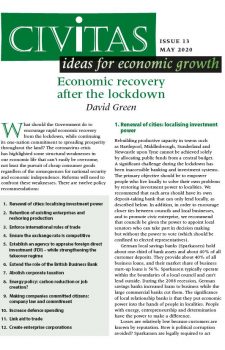
Economic recovery after the lockdown
David G. Green, May 2020
What should the Government do to encourage rapid economic recovery from the lockdown while pledging its one-nation commitment to spreading prosperity across all sections of society? In this report, David Green, Director of Civitas identifies how the coronavirus crisis has highlighted some structural weaknesses in our economic life – and offers twelve policy recommendations: Renewal of cities: localising investment power Retention of existing enterprises and… [Full Details]
Download PDF
Britain’s Export Boom: and how to encourage it
Marcus Gibson, May 2020
It has been widely claimed by many leading voices of the UK’s institutions, corporations and organisations that the UK would face a national disaster if it left the European Union. But as Marcus Gibson argues, a whole generation of organisations and individuals have been proved wrong – given that the post-Brexit UK economy expanded and vital sectors in manufacturing experienced a revival after decades… [Full Details]
Download PDF Buy from Civitas Buy From Amazon
The Great Disconnect: Why too many small business owners feel let down
Tim Knox, March 2020
For the past two decades, politicians from across the political spectrum have been vocal in their praise of small business – often to great acclaim when producing initiatives in government. But, do we know what business owners themselves think of government? As Tim Knox explains in this study on how micro-businesses feel about government, many policies and regulations have imposed heavy burdens on their operations… [Full Details]
Download PDF Buy from Civitas Buy From Amazon
Left Behind: Why voters deserted social democracy - and how to win them back
John Mills, October 2019
Something has gone badly awry with social democracy in recent years. Not so long ago, government by centre-left parties seemed almost to be the natural order of affairs in stable and prosperous economies. Today the position is very different, as voters have turned their back on them across much of the west. Where such parties have fared better – as in the UK – this tends… [Full Details]
Download PDF Buy from Civitas Buy From Amazon
Small Modular Reactors: What is the fuss about and why does it matter?
Candida Whitmill, November 2018
The UK needs to invest in a new breed of advanced modular reactors if it is to have any chance of meeting its decarbonisation targets over the coming years, energy entrepreneur Candida Whitmill argues in this paper. The government is supporting the development of small modular reactors (SMRs) – which are cheaper, safer and quicker to build than new nuclear power stations – as part of its… [Full Details]
Download PDF
The Left Case for Brexit: Active government for an independent UK
Philip B. Whyman, September 2018
Two years on from the vote for Brexit, the process of withdrawal remains mired in debate about the kind of relationship an independent UK should be seeking with the European Union and the wider world. With the date for departure moving ever closer, there is a desperate need for a clear vision of what a post-Brexit Britain should look like and be trying to… [Full Details]
Download PDF Buy from Civitas Buy From Amazon
Closing the Finance Gap: How a national investment bank could support enterprise and raise productivity
Justin Protts, February 2018
The UK economy is suffering from low productivity. This has been weighing heavily on GDP growth since the 2008 financial crisis, with output per worker stagnating at one of the lowest levels of any advanced economy. Raising productivity requires investment in productive enterprise. But UK investment, as a proportion of domestic output, has fallen from about a quarter of GDP in 1990, when it was… [Full Details]
Download PDF Buy from Civitas Buy From Amazon
Britain's Demographic Challenge: The implications of the UK’s rapidly increasing population
Lord Hodgson of Astley Abbotts, September 2017
The population of the United Kingdom is growing at a rate of more than 500,000 a year, equivalent to a new town of about 10,000 people being created every week. On current projections, by 2039 there will be nearly 10 million more people living here – enough to populate Greater Manchester three times over. What are the implications of this for the country, and… [Full Details]
Download PDF Buy from Civitas Buy From Amazon
Helping Businesses Thrive in Peripheral Rural Towns
Neil Powe and Rhona Pringle, July 2017
In this new report, Newcastle University academics Neil Powe and Rhona Pringle explore the scope for business-led growth and place-based revival in peripheral rural towns - those that are distant rather than accessible to large urban areas, and that are between 2,000 and 12,000 in population. The research aims to investigate whether businesses can thrive in peripheral rural towns and, if so… [Full Details]
Download PDF Buy From Amazon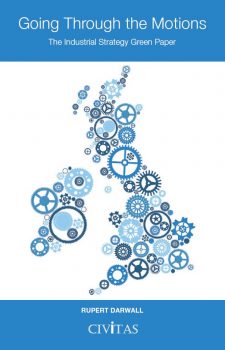
Going Through the Motions: The Industrial Strategy Green Paper
Rupert Darwall, June 2017
As the UK looks to benefit from the opportunities afforded by Brexit, Theresa May intends that the country’s economic success will be underpinned by a modern industrial strategy. The first outline of this was set out in a green paper published in January. In this pamphlet, Rupert Darwall argues that an industrial strategy is needed, in order to provide a coherent framework for policy… [Full Details]
Download PDF Buy From Amazon
Britain’s Achilles Heel: Our Uncompetitive Pound
John Mills, June 2017
Why is economic growth and prosperity in the world so patchy and unstable? Why have incomes for so many people stagnated? Why is there so much inequality – and why is there so much debt? Are all these conditions inevitable or are there more effective ways of ordering our economic affairs to achieve better results? In this new book, the economist and entrepreneur John Mills confronts… [Full Details]
Buy From Amazon
Competitiveness Before Carbon: How to safeguard Britain's just about managing companies by making energy costs a source of competitive advantage for UK firms
Glyn Gaskarth, February 2017
A series of policy initiatives since 2000 have rendered energy supply in the UK unstable and expensive. This has been driven by a desire to reduce carbon emissions in response to concerns about global warming. The effect, however, has been to drive energy intensive industries overseas, to countries with less carbon efficient means of production, resulting in a net increase in per capita global emissions… [Full Details]
Download PDF Buy from Civitas Buy From Amazon
Inclusive Capitalism: How we can make independence work for everyone
David G. Green, February 2017
The UK is taking back its independence at a time when some of the unspoken assumptions of recent times are shifting. To speak of the political left or the political right no longer has a clear meaning. Some say that the real divide is between globalisation and nationalism, but this distinction fails to capture what is really at stake, namely the accountability of political power… [Full Details]
Download PDF Buy from Civitas Buy From Amazon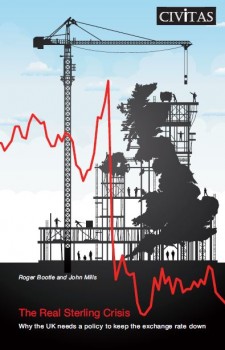
The Real Sterling Crisis: Why the UK needs a policy to keep the exchange rate down
Roger Bootle and John Mills, September 2016
The fall in the value of sterling since the vote for Brexit has had commentators wringing their hands with concern. But why are so many so quick to assume that a cheaper pound is a bad thing? The truth, as leading economists Roger Bootle and John Mills explain here, is that the British economy has suffered from an overvalued pound for many years. It has… [Full Details]
Download PDF Buy From Amazon
Defence Acquisition for the Twenty-first Century
Bernard Jenkin (ed.), June 2015
The recent campaigns in Afghanistan and Iraq came at a heavy cost to Britain's military capabilities. However, rather than replenish the forces with the equipment they needed, spending reviews in the last parliament saw defence expenditure so drastically reduced that the equipment used up in the campaigns cannot be replaced. These cuts have left all three services with large deficiencies in key areas. There… [Full Details]
Download PDF Buy From Amazon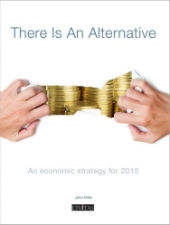
There is An Alternative: An economic strategy for 2015
John Mills, March 2014
The economic recovery has finally taken hold, but serious doubts remain about its strength, its sustainability and its ability to deliver improved living standards for all. In this hard-hitting critique of the UK's growth prospects, entrepreneur and economist John Mills warns that the current economic model is unsustainable and risks years of stagnation. By the time of the 2015 general election, living standards… [Full Details]
Download PDF Buy From Amazon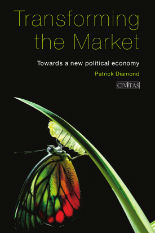
Transforming the Market: Towards a new political economy
Patrick Diamond, November 2013
Britain is at risk of a return to the unsustainable debt-fuelled growth that left the economy so badly exposed during the 2008 financial crisis. While recent growth figures have been encouraging, little has been done on the more fundamental task of rebalancing the economy and tackling the chronic short-termism which has held the UK back. Patrick Diamond, a former Downing Street adviser under… [Full Details]
Download PDF Buy From Amazon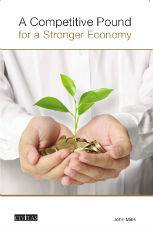
A Competitive Pound for a Stronger Economy
John Mills, October 2013
Recessions happen because there is insufficient demand to keep everyone occupied productively. The only solution is more demand, not less. Increases in demand, however, require major contributions from both the private sector as well as the public sector to be sustainable. Economists and policy makers, however, have a long history of looking the other way and ignoring the need for more demand to combat recessions… [Full Details]
Download PDF Buy From Amazon
An Exchange Rate Target: Why we need one
John Mills, April 2013
It is increasingly being recognised that the over-valued pound is holding back the competitiveness of British exporters. While sterling has fallen since 2008, the advantages have not been felt because of continued uncertainty. In this urgent and insightful publication, the economist and entrepreneur, John Mills, argues that the government should set a competitive exchange rate target and take active measures to achieve it. As… [Full Details]
Download PDF Buy From Amazon
Beyond the plc
Greg Fisher and Paul Ormerod, April 2013
What is wrong with contemporary capitalism? Was the financial crisis of 2008 caused by deep structural problems in the way firms are organised? Here two of Britain's most creative thinkers tackle these questions head on, showing that the UK lacks diversity in its forms of corporate governance and is too reliant on the plc model, which has been shown in recent years to have… [Full Details]
Download PDF Buy From Amazon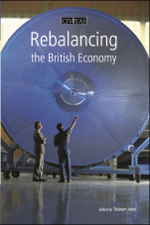
Rebalancing the British Economy
Edited by Tristram Hunt, March 2013
No other country in the world - including the United States - has allowed such a strong anti-interventionist economic policy to take hold in recent years. We, in Britain, have been restricted by the economic disasters of the 70s - which eventually required a bailout of over $4billion from the IMF - to such an extent that laissez-faire has ruled our ideological roost for several decades. But… [Full Details]
Download PDF Buy From Amazon
The German Sparkassen (Savings Banks)
Christopher Simpson, January 2013
Commentators across the political spectrum are pointing to the German system of local banks as a model for Britain to emulate. In this report, Christopher Simpson explains how these local German Savings Banks (Sparkassen) operate. He describes the history, structure and organisation of the Sparkassen, which are only allowed to lend within a geographically defined area and, as a result, develop close relationships with their… [Full Details]
Download PDF Buy From Amazon
Selling Circuits Short: Improving the prospects of the British electronics industry
Stephen L. Clarke & Georgia Plank, August 2012
Electronics products are pervasive but we tend to take their presence for granted. Those which do attract public interest are consumer electronics whose production is often dominated by companies in the Far East. This perhaps explains why Britain’s electronics industry has been undervalued, with the Government failing to recognise its significance in the UK’s struggle for economic growth. Selling Circuits Short is a… [Full Details]
Download PDF Buy From Amazon
The Boomerang Economy: Why British offshored manufacturers are returning home and how to maximise this trend
Laurence Kotlikoff, July 2012
Over the last decade, the offshoring of UK industry has been well publicised. Now we are beginning to see a new trend: onshoring – the return of British manufacturers from overseas. In The Boomerang Economy, David Merlin-Jones examines the reasons why this is happening and how the UK government can encourage it… [Full Details]
Download PDF Buy From Amazon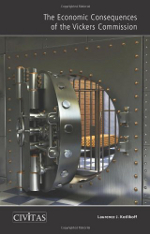
The Economic Consequences of the Vickers Commission
Laurence Kotlikoff, July 2012
The Vickers Commission was meant to put a stop to this by safeguarding ordinary retail banks from the gambling of investment banks. Laurence J. Kotlikoff shows that the Vickers proposals fail to do this. Even banks deemed ‘good’ can turn bad, since no one can predict which ‘safe’ assets will actually be safe in the future. Moreover, ‘bad’ banks are still left too big and… [Full Details]
Download PDF Buy From Amazon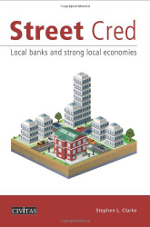
Street Cred: Local Banks and Strong Local Economies
Stephen L. Clarke, May 2012
Imagine an industry dominated by businesses that offer poor service, enjoy a terrible public image and lose billions of pounds. They don't go bust, but increase their market share under a supportive regulatory system. A ludicrous scenario, of course - but it describes much of Britain's banking industry today. Street Cred examines the failings of the current British banking market and the lessons that… [Full Details]
Download PDF Buy From Amazon
Extending Lending: The Case for a State-backed Investment Bank
David Merlin-Jones, February 2012
In this report, David Merlin-Jones argues that the only way to revive lending permanently is to go beyond restructuring commercial banks. Britain needs a new state-backed investment bank, described here as the 'Enterprise Bank' (EB). This would be able to raise cheap credit in the financial markets by using the UK's AAA credit rating and could pass this on to borrowers. It… [Full Details]
Download PDF Buy From Amazon
CO2.1: Beyond the EU's Emissions Trading System
David Merlin-Jones, January 2012
Merlin-Jones argues that the EU's Emissions Trading System (EU ETS) will have no effect on many companies' emissions until 2016-18, over a decade after it came into force. It is so ineffective and expensive that attempts to patch it up are doomed to failure. A new approach to carbon reduction is required. He proposes a new flat carbon tax to replace the… [Full Details]
Download PDF Buy From Amazon
The Green Mirage: Why a low-carbon economy may be further off than we think
John Constable, August 2011
The move towards a low-carbon economy has been described as the second industrial revolution. As state mandates drive the adoption of renewable energy sources, we are assured that multiple benefits will result. In The Green Mirage, John Constable challenges this optimistic scenario. Constable marshals evidence suggesting that target-led, state-managed and subsidy-driven clean energy policies are likely to cause the remature adoption… [Full Details]
Download PDF Buy From Amazon
Reviving British Manufacturing: Why? What? How?
Alan Reece, July 2011
Alan Reece, an academic-turned-successful-manufacturer, argues that we must revive our manufacturing industry. However, the problems are enormous. Between 1997 and 2008 manufacturing output remained flat at around GBP150 billion a year. Allowing for inflation, this represents a real reduction of around GBP3.5 billion a year. Alan Reece argues that we need to increase our output of goods by GBP10 billion a… [Full Details]
Download PDF Buy From Amazon
Chain Reactions: How the Chemical Industry Can Shrink Our Carbon Footprint
David Merlin-Jones, May 2011
Drawing on interviews with experts in the chemical industry, Merlin- Jones argues that the chemicals sector is the key to reducing UK carbon emissions and ensuring economic prosperity. Britain needs a policy that ensures an even footing for chemical firms competing internationally, by keeping the UK's energy costs attractive. Only this will allow chemical firms to provide the products vital to combatting climate change… [Full Details]
Download PDF Buy From Amazon
Prosperity with Principles: Some policies for economic growth
David Green, April 2010
The recession has sparked a debate about the renewal of manufacturing. It is now generally accepted that the government should create the conditions in which manufacturing can flourish. How it should do so is strongly disputed. David Green presents new thinking on how to encourage economic growth without compromising our commitment to free enterprise.He advocates 'prosperity policy', which does not dismiss state aid, but… [Full Details]
Download PDF Buy From Amazon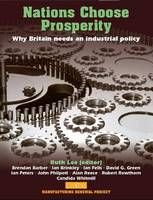
Nations Choose Prosperity Why Britain Needs an Industrial Policy
Ruth Lea, July 2009
After years of being seen as outmoded, industrial policy is back on the political agenda, this time renamed 'industrial activism'. There is a widespread concern, fuelled by the crisis in the financial sector, that we have been too complacent about the decline in UK manufacturing, assuming that service industries would guarantee continuing prosperity with or without a vibrant manufacturing base. No one argues for protectionism… [Full Details]
Download PDF Buy From AmazonBriefings
Developing SBRI: Using procurement to spur innovation
Civitas, June 2017
Supporting Industry Post-Brexit: Supply chains and the automotive industry
Justin Protts, May 2017
Boosting UK Exports: Improving export finance for small businesses
Christian Stensrud, March 2017
Reports
Investigating the relationship between tax credits and wages offered by employers
Rajen Paul, February 2016
Losing Control: A study of mergers and acquisitions in the British aerospace supply chain
Norman Smith & Joseph Wright, June 2015
Ending the Free Ride: Making multinationals pay their way
Peter Connell, November 2014
Articles for the Media
The two big tests awaiting the Prime Minister's 'Mayconomics' agenda
David Green, The Telegraph, August 2016
Six radical, Conservative ideas to stimulate the Brexit economy
David Green,Telegraph , July 2016
Britain may pay price for closer ties with China
Daniel Bentley, The Yorkshire Post , October 2015
